The four-part true crime documentary Evil Genius is currently available on Netflix. For those unfamiliar with the story, it follows the infamous 2003 case of a pizza delivery man who had a bomb strapped to his neck and was forced to rob a bank. It’s a grizzly, disturbing case filled with twisted characters that lead to more unbelievable crimes. It’s a riveting documentary, and I highly recommend checking it out.
Last week, I got to interview Evil Genius directors Trey Borzillieri and Barbara Schroeder about the miniseries. We talked about how they landed on the title, the four-episode structure, working with law enforcement, their conclusions on the case, and more. Also, near the end of the interview, we start moving into spoiler territory, so please be sure to check that out after you finish the series.
Check out the full interview below, which has been edited for clarity.
How did you guys get involved with this project?
TREY BORZILLIERI: Well I'll start by saying I was looking for a story and by coincidence I was in my hometown, Buffalo, New York, on August 28, 2003, the day that this happened, and it came over the evening news that there was a bank robbery where the robber had used a live bomb and it had detonated in the process killing him. And so immediately I was like, "Wow, how desperate did that man have to be to use a live bomb." And from that moment, I just was in my mind and the next day start to trickle out that there was evidence at the scene that this man had been forced to do this, and that was when the mystery began, and it grew from there. And so I worked on it for 10 years, conducting interviews, the whole nine yards and brought Barbara on board in 2013 because questions still remained even after the federal trial of Marjorie Diehl-Armstrong, and at that time we became a team just looking for, you know, trying to get the story together and deeper truths, and what you see today is where it went.
And how did the four episode structure come together?
BARBARA SCHROEDER: Yeah, that was, boy we could have done like 10 episodes and we had our executive producer, Mark Duplass and his brother, Jay Duplass. Mark helped giving us feedback and Josh [Braun], who was our sales agent, who connected us with Mark, and Netflix actually was very involved in the creative process of this and they would guide us and say, "Okay, let's bring it down to four", even though we wanted to do 10. And when we were given those parameters, it really kinda fell into place. We had a strategy here, and our editor, Alex [Clears], was very pivotal in this.
Our strategy was let's make sure every day that we step into the edit room that we keep this story on a track, because it's so easy because there's so many, were co-conspirators, there are substories, subplots, dark love story. So we wanted to make sure every day that we were in the edit room, that we stayed on track and we didn't veer off, and it naturally fell into a very simple rhythm of let's first talk about the first crime, let's talk about the other crime, the frozen body, are they connected, then let's talk about all the suspects, and then let's go to the confessions and the new information that we were able to get thanks to Trey's relationships that he has built with some of the co-conspirators and also some other people, including an elusive eye witness, who gave us an amazing confession that the FBI was unable to get.
Do you think the title, Evil Genius, do you think that refers more to Diehl-Armstrong or Rothstein or is that meant to be open to interpretation?
BORZILLIERI: I would say it is open to interpretation. Obviously Marjorie comes to mind for sure, but the fact that this case, it went cold initially, and so these co-conspirators got ... this case was designated an FBI major case, which is designation, and these co-conspirators, these fractured intellectuals were able to get this 50 person, multi-agency task force off their trial for two years, and as a result of that, the investigators had to play catch up. There was somethings unfortunately occurred. One of the co-conspirators was given immunity. So there's an element that this crime, because of the luck, perhaps it's because they were crafty criminals who were almost veteran criminals, there's sort of an evil genius to the crime.
SCHROEDER: Well and we didn't actually name it. Technically, I mean we did, but it was Marjorie who named it for us in one of her, we were trying to come up with a, we were gonna call it the Collar Bomb, we had different ideas, but then we're sitting in the edit room one day and we hear Marjorie say protesting, "I'm not some evil genius", and we thought, "Oh, there's our title." Marjorie, thank you.
Do you think this crime, this heist, was inevitable given the players involved?
SCHROEDER: I think it was, I wouldn't say inevitable, I would say it's astonishing that this happened. That all these people and their motives blended together and it was like a perfect storm of needs, wants, and desires, and evilness, and everybody had kind of a different motive, different shades of a motive. So yeah, shades of evil genius from everybody just happened to create this perfect storm and create this one of a kind FBI major case.
Would it have been possible to release this documentary when Diehl-Armstrong or Rothstein were still alive, or would that has risked legal action from them?
BORZILLIERI: Oh, it would have been possible. There was no hold up on our part. This documentary is what it looks like today because the case was so complicated. There was always more information on the horizon, and it took this long to get to the end of what you see reveal itself in part four.
I’m going to start going into a little bit of a spoiler territory, and we'll note this in the interview, just for people who have questions, why do you think that Rothstein and Diehl-Armstrong chose to make a real bomb? I mean, I don't think Wells probably could have told the difference, or anyone really.
SCHROEDER: Yeah, I think that that's one of the big questions that we had, I mean, the FBI said the case was closed, but we felt like there were a lot of questions that still remained. Simple ones like who, for sure, was the mastermind who started this, who wrote the notes, but that's the one that really we would love to have been able to get to the bottom of. Like who did is an intricate question, it's a detailed question, but it's who decided to make the bomb live, because to use that's the person who murdered Brian Wells because that's the person who flipped the switch and went from just a bank robbery to this public execution.
BORZILLIERI: Yeah, and it's another, it's just in this case, like no other, that's what's so addicting about it. Nothing is what it seems, and so, as we start the conversation about the bank robbery, first thing is obvious, but wow, how did they ever expect to pull this off, it was so complicated. They could never have gotten the money, and so, as it begins to move away from the idea that this was really supposed to be a successful bank robbery, it starts to look more, in the FBI profilers said it themselves, one of the motives here is the murder of Brian Wells. So, it starts to shoot away from oh, because it would be a bank robbery, but perhaps it really was intended to be a public execution because that's what happened.
Which of course then raises the question, what would be the motive for the execution of someone who, as Hoopstick claims, was kind of a rube in this scenario?
SCHROEDER: Right, and that, most likely, was eliminating an eye witness. That was somebody trying to tie up the loose ends of their diabolical plan.
Well and a question that I've been sort of wrestling with since I saw the documentary was, if Wells was a rube, as Hoopstick claims, then way would be repeat the lie that black men placed the bomb around his neck?
BORZILLIERI: Yeah, it's a great question and it's one of those that at the heart of the debate of his culpability for sure. If you can hear in some of the audio with Ken Barnes that he refers to it being Marjorie as the one that told Brian Wells, he got hold of police, pulled him over, tell them that black men did this, and that was another astonishing revelation to this new information that we were able to achieve in the documentary and the efforts.
What was the relationship like interviewing law enforcement and you're investigation as complementary or was there any friction there?
BORZILLIERI: I'm glad you asked because it was really difficult and that's how I ended up with Marjorie back then, because as I mentioned before, the case went cold, and so it was very tight lipped, there was a federal gag order over the case, but no one was allowed to talk about it. So anytime I approached law enforcement back then, they wouldn't tell me anything, and so Marjorie was really the only one remaining that I hoped I could get information from and all those interviews with law enforcement that you see in the series, those gentleman waited until they had retired in order to talk about the case. So that shows you how tight lipped it really was.




